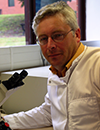Glyn Stacey,
Director/Head,
National Institute for Biological Standards and Control
I am in charge of the UK Stem Cell Bank, which prepares stem cell lines for use worldwide in research and in the development of new therapies for human diseases.
Stem cells are immature cells that have not yet developed into the specialised cells that make up our organs and tissues. They may offer a revolutionary way to treat such illnesses like Parkinson’s and Alzheimer’s diseases by replacing damaged body tissues with healthy new cells. They may also provide valuable laboratory research tools for the investigation of disease and testing new drugs. A stem cell line is a population of identical stem cells that can replicate themselves for long periods of time, outside of the body.
My challenges are two-fold. First, we are trying to grow these cells reliably in the lab. We work in rooms full of high-tech equipment such as cell culture cabinets, cell freezing apparatus and DNA preparation machines. We have to test the cells to make sure they meet the requirements of researchers and clinicians.
Second, my job is political. Different countries vary in their ethical regulation of stem cell research and so we have to reach agreements to ensure that the lines are handled appropriately by bona fide researchers with appropriate ethical approval. I spend much of my time communicating, via email, phone and face-to-face, with health and regulatory officials, including representatives from the Department of Health, the World Health Organization and national regulatory and funding bodies.
On a good day, I’ll reach a consensus with these people on a technical or regulatory issue, such as the safety of cells used in vaccine manufacture. This will enable work to move forward. It’s also good when we get researchers to deposit new lines. On a bad day, we’ll spend time dealing with complicated bureaucracy with little real progress.
|

|
|

 Add to Calendar ▼2014-05-15 10:45:002014-05-15 11:45:00Europe/LondonStem Cell Culture Automation: Challenges and Benefits Advances in Automation and Robotics in Barcelona, SpainBarcelona, SpainSELECTBIOenquiries@selectbiosciences.com
Add to Calendar ▼2014-05-15 10:45:002014-05-15 11:45:00Europe/LondonStem Cell Culture Automation: Challenges and Benefits Advances in Automation and Robotics in Barcelona, SpainBarcelona, SpainSELECTBIOenquiries@selectbiosciences.com Add to Calendar ▼2014-05-14 00:00:002014-05-15 00:00:00Europe/LondonAdvances in Automation and RoboticsAdvances in Automation and Robotics in Barcelona, SpainBarcelona, SpainSELECTBIOenquiries@selectbiosciences.com
Add to Calendar ▼2014-05-14 00:00:002014-05-15 00:00:00Europe/LondonAdvances in Automation and RoboticsAdvances in Automation and Robotics in Barcelona, SpainBarcelona, SpainSELECTBIOenquiries@selectbiosciences.com